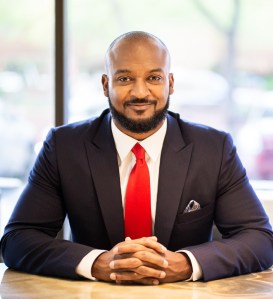
Darius Green, founding member & CRE expert at Keyser
For our next entry in the Expert Insights series, we chatted with Darius Green, founding member and commercial real estate (CRE) expert at Keyser. Darius has a law degree from Arizona State University with fourteen years of experience as a real estate professional in Phoenix, Ariz. He shared with us his views on the current challenges and future trends of the commercial real estate market, as well as what sets the Phoenix office market apart.
Q: Could you start by telling us a little bit about your background and why you chose a career in commercial real estate?
Commercial real estate was not on my radar as a career until a few years after law school. I discovered the industry at the suggestion of a mentor of mine who is a successful commercial real estate investor. I wanted a career where I could use my legal education and have a fiduciary/advisory role with business leaders and entrepreneurs without practicing law or billing by the hour.
Looking back, the initial seed for commercial real estate was planted when I was much younger, and it still motivates me. My parents were small business owners in my junior high school years. That retail business eventually failed primarily because of some poor uninformed real estate decisions. I firmly believe that the business could have been a long-term success if they had used a tenant broker to advise them in their real estate process. The lifeblood of our economy is small business and entrepreneurship and I’m passionate about helping businesses of all sizes be strategic with their real estate expenditures and get the most out of those dollars spent on what is typically the second or third largest expense. That passion has led me to be a tenant/corporate services broker my entire real estate career. Prior to law school my first career was in the sales and marketing aspect of the professional team sports industry.
Q: Considering the COVID-19 outbreak, what are your thoughts on the CRE market in the US today in terms of trends and challenges?
It’s a particularly unique challenge that literally is affecting every industry, landlords and tenants in one way or another. Whether it’s tenants in need of a rent relief or landlords needing to work with their lenders and capital partners, everyone is impacted in the short term. Commercial real estate has rough waters ahead from the standpoint of landlords and investors. We are starting to see landlords miss timely payments as indicated by the significant rise in the CMBS delinquency rate. Price indexes tell us that commercial real estate valuations are falling and, outside of industrial, commercial REITs have underperformed the S&P 500.
We know from the standpoint of tenants that retail and hospitality have been hit the hardest and many brick and mortar retail businesses are facing difficulties. Office users are re-evaluating their footprints after workforce layoffs and after enduring the experiment of having their employees work remotely. As a result, we are seeing and will continue to see more subleases as well as more rightsizing for those companies that believe a greater percentage of employees working remotely aligns with their operational business model. I’d expect these factors causing greater vacancy along with other macroeconomic forces to put downward pressure on rents and turning the general tide for the past number of years across most markets from a landlord’s market to a tenant’s market. We are also helping an increasing number of companies with sale-leasebacks and I expect a continued rise in these types of transactions for companies that own their real estate and could use a cash infusion as part of their strategy in reaction to the realities of COVID-19, whether offensive or defensive. Investors will be and are looking for stable assets to preserve and grow wealth during an unpredictable time ahead in the securities markets.
Q: What differentiates the commercial real estate market in Arizona from other major markets in the United States?
The Greater Phoenix office market is unique because even though Phoenix is among the top five cities by population, it is also the youngest and on the larger side in terms of square miles. What this means is that even though one can perennially find Phoenix on lists of fastest-growing cities, we still have a lot of runway left for development across sectors, as we don’t nearly have the density or office inventory of the other top five cities New York, Los Angeles, Chicago and Houston.
In years past, Arizona’s year-round sunshine and blue skies made Phoenix more known for its hospitality than big business. This is changing thanks to organizations like the Greater Phoenix Economic Council and a competitive business climate. Word is getting out to employers that we have the right talent to sustain and grow their enterprises graduating from our schools or moving here for more opportunity, nice weather, and a lower cost of living. Additionally, our wages are competitive, our real estate is significantly less expensive, and our business community is thriving with initiatives like Arizona’s Fintech sandbox supporting businesses as they test innovative financial products or services.
Finally, the last major differentiator for Arizona in the commercial real estate markets is that Arizona has always been a favored location for digital infrastructure investment, for its low total cost of ownership, nominal natural disaster profile and its abundant access to natural resources, including water and reliably low cost of power. Over the last 7 years the market has notably gained attention because of State incentives passed in 2013 which provide for substantial cost savings to enterprise end users as well as developers. In short, the market has grown from being known as a disaster recovery market to one which the largest cloud service providers in the world call home. Arizona is the place to be.
Q: Where do you see the CRE industry going in the future?
I expect to see continued innovation in technology that disrupts industry models and paradigms and I predict it will push client service, social consciousness in action, transparency and relationships to the forefront of importance for companies and practitioners to stay relevant and profitable. I don’t think the mergers will stop either.
Q: Are there any lessons from the past few years that you would impart as an absolute must for those looking to get into the CRE industry?
This industry is not easy, it’s very competitive and nothing stays the same for too long. So, for those looking to get into brokerage, you need thick skin, patience, people skills and discipline. Joining a good team with seasoned servant leaders and having experienced mentors to bounce things off without them necessarily being “in the deal” is also critical. But discipline is really the cornerstone whether it is in your business development practices, continuously learning your craft, or in managing your personal finances to weather slower times in the market cycles.
Q: How has the evolution of online marketing impacted the commercial real estate industry?
From a listing standpoint, online marketing in particular has been great for brokerage because more people from all around the world can become aware of listings anywhere whereas previously only direct mailing pieces, or ads in various print media outlets had similar reach. These were less effective, had limited scope and were more expensive.
Residential real estate embraced online marketing immediately and it is more of a natural fit as a business-to-consumer sell whereas I think commercial is just starting to get comfortable with marketing the business-to-business sell online. Frankly, that is the great thing about online marketing: with the information and technology available, one can have very targeted customized campaigns as well as those more general and wider in scope while being able efficiently track their effectiveness.
Online marketing from a company branding or individual agent/team branding perspective has had a much slower evolution in commercial real estate but we’re starting to see it accelerate.
Q: Any other insights that you’d like to share?
My firm Keyser is unique for three reasons. First, literally everything we focus on, whether it is my team ROC or any agent at our firm, is being geared towards putting the tenant or buyer in the best position possible to execute an effective real estate strategy aligning with their business objectives. This is so important because tenants can have difficulties finding good representation and real estate is typically among an organization’s top two or three expenses, while also affecting many areas like operations, culture, employee retention and recruiting, branding, and client services to name a few. Secondly, we are a full service corporate services firm but another thing that makes us very unique is our Business Advisory Service division — which I like to call our “human capital consulting” arm — which helps organizations make sense of their human resources-related issues.
In closing, the final item that makes us unique is our culture at Keyser. We have 15 core operating principles built on the idea of service that give us a compass both individually and collectively. We are always looking for bright, coachable, aligned, talented people with a passion for commercial real estate to join our team.









